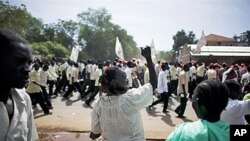The State Department said Tuesday said U.S. diplomats are working with northern and southern Sudanese officials in an effort to clear away a key obstacle to next January's referendum on southern independence. The effort is a follow-on to last week's United Nations meeting on Sudan involving President Barack Obama.
Last Friday's U.N. meeting included pledges by the Sudanese parties to hold the January referendum on time and respect the results.
The State Department says the United States has launched a diplomatic effort to help them resolve one of the main problem issues in that process, concerning the status of the oil-rich central Sudanese region of Abiyeh.
The January 9 referendum is to include a vote in Abiyeh as to whether the region would be part of an independent southern Sudan, if the now-autonomous south votes to secede.
Efforts to organize the vote in Abiyeh have been lagging. State Department Spokesman P.J. Crowley told reporters negotiating teams of the north and south worked through the weekend in New York with U.S. Sudan envoy Scott Gration and Assistant Secretary of State Johnnie Carson, focusing on the Abiyeh issue.
Crowley called the closed-door New York meetings useful and said they "established a foundation" for resolving the Abiyeh issue.
He said a follow-on meeting is planned at a still-to-be-determined date next month in Addis Ababa, and that the parties should come to it ready to settle the Abiyeh issue.
"There are unresolved issues that have to be advanced to have successful referendum. We are working through them as we committed last week. Abiyeh is our immediate focus. There are other issues regarding boundaries," said Crowley. "There are clear responsibilities that both north and south have. And while we worked through some of the issues this weekend, we expect that both sides, particularly Khartoum, needs to come to the next meeting prepared to reach an agreement."
Mr. Obama's presence at the U.N. meeting last week underscored the importance the administration attaches to a successful conclusion to Sudan's north-south peace process.
He held out the prospect of normalized relations with Sudan and an end to U.S. sanctions against Khartoum, if the January referendum is carried out peacefully and the conflict in Darfur can be settled.
The president said failure on either front would bring further isolation for Sudan.
Sudanese Vice President Ali Osman Taha, who also addressed the U.N. gathering said the mainly-Muslim north prefers an outcome that would preserve Sudan's unity. But he said that for the sake of peace, it is prepared to "relinquish" the mostly Christian and animist south.
The referendum climaxes a six-year period of autonomy for the south provided for in the country's 2005 Comprehensive Peace Accord.
US Seeks Breakthrough on Sudan Referendum




